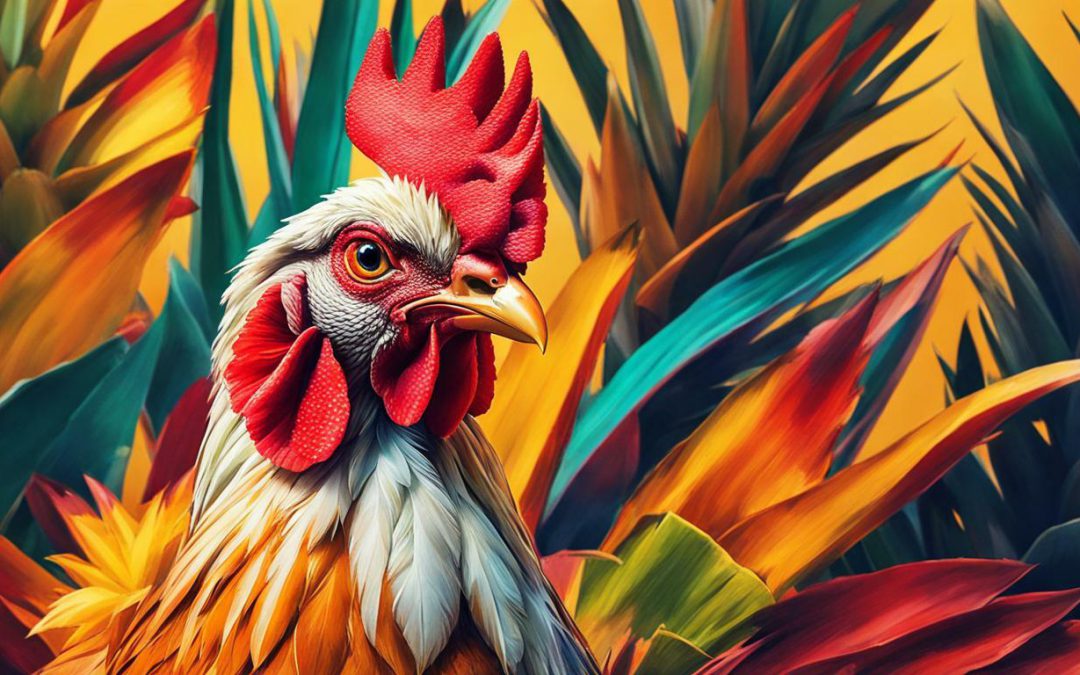Chickens are known for their varied diet, but can they enjoy the tropical sweetness of pineapple? In this section, we will explore whether chickens can safely consume pineapple and the potential benefits it may offer to their health and nutrition.
Key Takeaways:
- Feeding chickens pineapple in moderation can boost their immune system, protect against worms, and fight arthritis.
- Pineapple can help with indigestion and provide essential vitamins and nutrients for chickens.
- Not all chickens may like pineapple, and some may have a hard time digesting it if given too much.
- It’s important to feed pineapple in proper portions and avoid giving underripe or overripe pineapple, as well as the skin and crown.
- Dried pineapple can be a safer alternative for chickens.
The Chicken Diet: Understanding Poultry Nutrition
As responsible chicken keepers, it is crucial to understand the dietary requirements of our feathered friends. Just like humans, chickens need a balanced diet to maintain their health and wellbeing. A proper chicken diet consists of various nutrients, including proteins, carbohydrates, fats, vitamins, and minerals.
Proteins are essential for chicken growth, feather development, and egg production. Good sources of protein include soybeans, corn, and peas. Carbohydrates, on the other hand, provide energy for chickens. They can be found in grains like wheat, barley, and oats.
Fats are another important component of the chicken diet. They not only provide energy but also help with nutrient absorption and insulation. Chicken diets typically include fats from sources like fish meal and vegetable oils. Vitamins and minerals are crucial for overall health and disease prevention. These can be obtained through a variety of sources, such as leafy greens, fruits, and supplements specifically formulated for poultry.
The Role of Proper Nutrition
When chickens receive a well-balanced and nutritious diet, they are more likely to have stronger immune systems, which helps them fight off diseases and infections. A proper diet also promotes healthy egg production, with eggs being rich in essential nutrients for both humans and chickens.
Feeding chickens the right foods in the correct amounts is essential for their optimal health and productivity. It’s important to provide a variety of foods to ensure they receive a wide range of nutrients. Additionally, fresh and clean water should always be available to keep chickens hydrated and aid in digestion.
By understanding the importance of proper nutrition and providing a balanced diet, you can ensure your chickens lead happy and healthy lives. So, go ahead and feed your chickens a well-rounded diet, filled with protein, carbohydrates, fats, vitamins, and minerals, and watch them thrive!
| Nutrient | Food Sources |
|---|---|
| Proteins | Soybeans, corn, peas |
| Carbohydrates | Wheat, barley, oats |
| Fats | Fish meal, vegetable oils |
| Vitamins and Minerals | Leafy greens, fruits, supplements |
Pineapple for Chickens: Safe and Beneficial?
If you’re wondering whether it’s safe to introduce pineapple into your chicken’s diet, you’re not alone. Many chicken owners are curious about the potential benefits and risks of feeding this tropical fruit to their feathered friends. Luckily, the answer is yes – chickens can indeed eat pineapple, and it can be a healthy and beneficial addition to their diet when given in moderation.
Feeding chickens pineapple in moderation can provide a range of health benefits. Firstly, pineapple is rich in vitamin C, which can boost their immune system and help them fight off common illnesses. Additionally, this tropical fruit contains enzymes that have been found to protect against worms, promoting intestinal health in chickens. Pineapple also contains bromelain, a natural anti-inflammatory compound that can help alleviate arthritis and joint pain in chickens, promoting better mobility.
Furthermore, pineapple can aid in digestion and relieve indigestion in chickens. The fruit’s natural enzymes can help break down proteins, making it easier for chickens to digest their food. However, it’s important to note that not all chickens may enjoy the taste of pineapple, and some may have a harder time digesting it if given too much. Therefore, it’s crucial to feed pineapple in proper portions and observe your chickens’ response to ensure they can tolerate it well.
Safe Feeding Practices for Chickens
- Offer pineapple in small quantities initially to see if your chickens take a liking to it.
- Avoid giving underripe or overripe pineapple, as these can be more challenging for chickens to digest.
- Remove the skin and crown of the pineapple, as they can be tough and difficult for chickens to consume.
- Consider offering dried pineapple as an alternative, as it provides similar nutritional benefits and is easier for chickens to eat.
In summary, pineapple can be a safe and beneficial addition to your chicken’s diet. When fed in moderation, it can boost their immune system, protect against worms, alleviate arthritis, aid in digestion, and provide essential vitamins and nutrients. Just remember to introduce pineapple gradually, observe your chickens’ response, and feed it in proper portions. By following these guidelines, you can offer your chickens a tasty tropical treat while enhancing their health and well-being!
| Benefits of Feeding Pineapple to Chickens | Feeding Recommendations |
|---|---|
| Boosts immune system | Offer pineapple in small quantities initially |
| Protects against worms | Avoid underripe or overripe pineapple |
| Relieves arthritis | Remove skin and crown of the pineapple |
| Aids digestion | Consider dried pineapple as an alternative |
Moderation is Key: Feeding Pineapple to Chickens
While pineapple can offer health benefits to chickens, it is essential to practice moderation when incorporating it into their diet. Feeding chickens pineapple in the right portions can provide a range of advantages for their overall well-being. Pineapple is known to boost the immune system, thanks to its high vitamin C content, which helps chickens fight off diseases and infections.
Pineapple also contains bromelain, an enzyme that can aid in digestion and help chickens with indigestion or gastrointestinal issues. Additionally, the bromelain found in pineapple has anti-inflammatory properties and can potentially alleviate symptoms of arthritis in chickens.
It is important to note that not all chickens may enjoy pineapple, and some may have difficulty digesting it if given too much. To ensure their safety, feed pineapple in moderation and avoid offering underripe or overripe pineapple, as well as the skin and crown, which can be challenging for chickens to digest. A safer alternative can be dried pineapple, which still provides many of the same nutrients.
| Benefits of Feeding Pineapple to Chickens: |
|---|
| Boosts the immune system |
| Aids in digestion and helps with indigestion |
| Potential anti-inflammatory effects for arthritis |
| Provides essential vitamins and nutrients |
In conclusion, while pineapple can be a healthy and beneficial addition to a chicken’s diet, it is crucial to feed it in moderation and be attentive to your chicken’s preferences and digestion. Offering pineapple in proper portions and avoiding the skin, crown, and extremes of ripeness can help ensure your chickens enjoy the benefits without any adverse effects. Remember, a balanced and varied diet, including a mix of safe fruits and vegetables, is key to maintaining your chickens’ health and nutrition.
Conclusion
After exploring the topic in depth, it is clear that chickens can indeed enjoy the tropical goodness of pineapple, but it should be given in moderation and with proper care. Feeding chickens pineapple can have several benefits for their health and nutrition. Pineapple consumption in chickens can boost their immune system, protect against worms, fight arthritis, help with indigestion, and provide essential vitamins and nutrients.
However, it is important to note that not all chickens may like pineapple, and some may have difficulty digesting it if given too much. To ensure their well-being, it is crucial to feed pineapple in proper portions. It is also advisable to avoid giving underripe or overripe pineapple, as well as the skin and crown, as these parts can be difficult for chickens to digest.
If you’re concerned about the potential risks of feeding fresh pineapple, dried pineapple can be a safer alternative. Dried pineapple retains most of its nutritional value and is easier for chickens to consume and digest. Just remember to offer it in moderation as well.
In conclusion, pineapple can be a healthy and beneficial addition to a chicken’s diet when given in moderation. It is important to observe your chickens’ preferences and digestive capabilities when introducing new foods into their diet. By providing the right amount of pineapple and being mindful of their overall nutritional needs, you can treat your feathered friends to a tasty and nutritious tropical snack.
FAQ
Can chickens eat pineapple?
Yes, chickens can eat pineapple and most of them find it to be a tasty treat.
What are the potential benefits of feeding pineapple to chickens?
Feeding chickens pineapple in moderation can boost their immune system, protect against worms, fight arthritis, help with indigestion, and provide essential vitamins and nutrients.
Are all chickens able to digest pineapple easily?
Not all chickens may like pineapple, and some may have a hard time digesting it if given too much. It’s important to feed pineapple in proper portions and avoid giving underripe or overripe pineapple, as well as the skin and crown, which can be difficult to digest.
Can dried pineapple be given to chickens as an alternative?
Yes, dried pineapple can be a safer alternative to fresh pineapple for chickens.
Is pineapple a healthy addition to a chicken’s diet?
Overall, pineapple can be a healthy and beneficial addition to a chicken’s diet when given in moderation.

